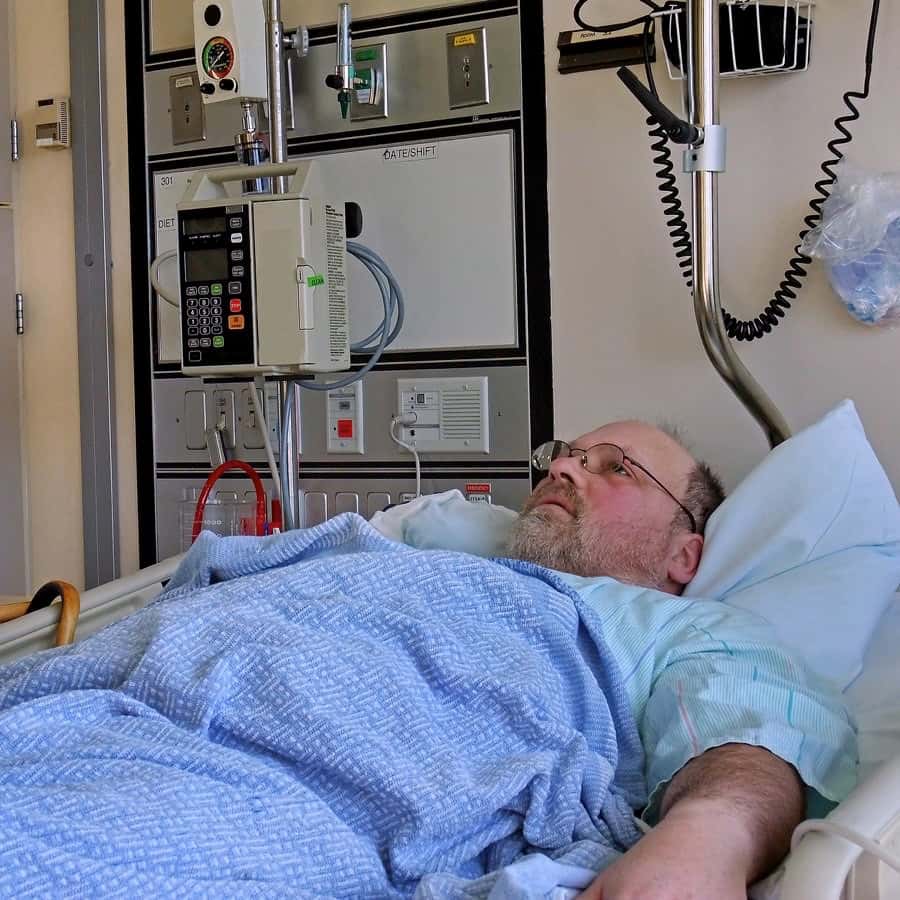
Seems like an oxymoron, doesn’t it? Get a good night’s sleep in the hospital? Who are we kidding? New research from the Netherlands confirms that patients lose a lot of sleep when they are hospitalized. But does it have to be that way? Why do hospital personnel frequently wake patients up, especially in the early morning hours? What’s with all the blinking lights and beeps? If sleep is important for healing, shouldn’t health professionals figure out strategies to help people sleep in the hospital?
How Much Sleep Do You Lose in the Hospital?
A study published in JAMA Internal Medicine (July 16, 2018) documents the actual amount of sleep lost during hospitalization. The researchers collected data from 2000 patients in the Netherlands at 39 different hospitals.
Why They Did the Study:
“Although inadequate sleep has a proven negative association with health care outcomes, to date, no large-scale studies have examined sleep in general hospital wards.”
Goals of the Study:
“To assess the subjective quantity and quality of sleep and to identify the hospital-related factors associated with sleep disturbances in hospitalized patients.”
What They Found:
On average, people lost 83 minutes of sleep in the hospital compared to their home environment. The authors concluded that sleep quantity and quality was compromised in hospitalized patients. Awakenings by hospital staff and noise were the most common “sleep-disturbing factors.” In their own words:
“We found that hospitalized patients slept shorter times with more interruptions, woke up earlier, and experienced poorer sleep quality than at home. In two-thirds of cases, disturbances involved hospital-related factors, of which many seem modifiable.”
Why Sleep in the Hospital Is Important:
Disrupted sleep in the hospital is associated with confusion, delirium, postoperative complications and higher mortality. The authors of this research point out that:
“A good night’s sleep improves cognitive and emotional functioning, which is important during an often emotionally challenging stay in the hospital. Sleep is essential for adequate immune, metabolic, and endocrine functioning and may have an association with healing and survival.”
What To Do To Sleep in the Hospital:
A commentary in JAMA Internal Medicine (July 16, 2018) accompanied the research article. The authors emphasize how important it is for patients to sleep in the hospital.
“When our patients relate their difficulty sleeping in the hospital, they are not reporting only a nuisance but also a direct contributor to adverse outcomes, even mortality.
The authors go on to encourage their colleagues “involved in the care of hospitalized patients to optimize sleep in the hospital.” They note that:
“In a recent randomized controlled study, the simple intervention of providing earplugs to patients in the ICU was associated with a lower incidence of confusion.”
“Outside the ICU, the multicomponent Hospital Elder Life Program (HELP), of which one of us (S.K.I.) was the developer and which includes a nonpharmacologic sleep protocol, was associated with a reduced incidence of delirium and falls, length of stay, hospital and 1-year health care costs, institutionalization, and readmissions. The HELP sleep protocol includes warm drinks, massage, relaxation music, unit-wide noise reduction strategies, and effective schedule adjustments and has been linked with decreased use of hypnotics [sleeping pills] and improved quality of sleep correlated with the number of parts of the protocol engaged. HELP and related programs have shown that it is possible to be thoughtful about addressing hospital-related factors that disrupt sleep and, of importance, that these interventions improve health care outcomes and cost-effectiveness of care.”
The authors of this commentary in JAMA Internal Medicine conclude with words of wisdom:
“Only with widespread shifts in current practice and consistent implementation of such interventions can we reconfigure the US hospital as a more humanistic, healing, patient-centered environment where the essential human need for sleep is prioritized.”
The People’s Pharmacy Perspective:
Sleep is important! Sleep in the hospital is especially crucial. It aids in immune function and healing. If you or someone you love has to go into the hospital, tell all the nurses and the physicians you see that you would like to get a good night’s sleep.
Ask them to:
- Reduce the sounds and light as much as possible
- Turn off overhead paging
- Supply ear plugs and eye masks
- Minimize sleep interruptions during the night unless they are critical for survival
- Decrease room alarms and implement remote alarm systems at the nursing station
- Encourage blood draws during the day and early evening
- Reduce routine vital sign measurements overnight if possible
If there is pushback, ask the health professionals you interact with to look up the Invited Commentary in JAMA Internal Medicine (July 16, 2018) by Matthew E. Growdon, MD, MPH and Sharon K. Inouye, MD, MPH. These brilliant physicians are associated with Harvard Medical School and prestigious hospitals in the Boston area. They are at the top of their game and their advice should be heeded.
Share your own thoughts and experiences about getting to sleep in the hospital below in the comment section. Have you discovered some useful tips for overcoming the paging, beeping, flashing lights and midnight awakenings? If so, we’d love to share your experience with other visitors.

